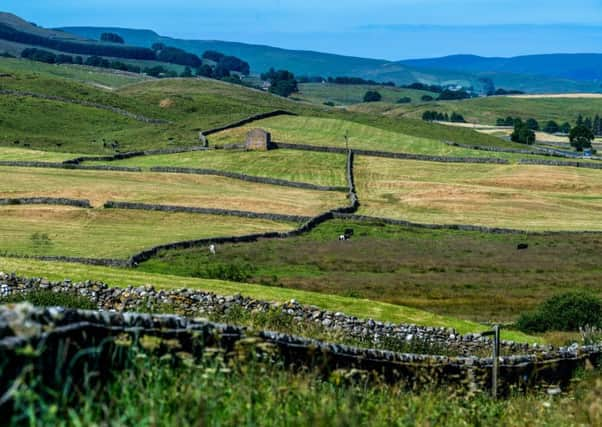Michael Gove pledges support for farmers amid drought concerns


The National Farmers’ Union (NFU) met officials in London today to discuss “tinderbox” conditions that have reduced grass growth and “depleted” some yields.
The UK has seen its driest first half of summer since 1961, with last Thursday and Friday bringing the first rainfall in weeks, and farmers have warned the hot, dry conditions have hit harvests.
Advertisement
Hide AdAdvertisement
Hide AdScientists have said the heatwave gripping northern Europe was made twice as likely by climate change, and the UK faces a future of increasingly common episodes of extremely hot spells.
Farmers also face uncertainty over the future of the sector after Brexit, with changes to their subsidies and potential impacts of trade deals with the EU and countries such as the US.
Speaking outside the meeting, Mr Gove emphasised the importance of supporting future food production and taking steps “in order to ensure we can improve and enhance our resilience against the challenge of climate change”.
He also said: “We will make sure farmers have what they need in order to provide us with high-quality food and ensure their businesses survive.
Advertisement
Hide AdAdvertisement
Hide Ad“We want to be flexible and we don’t want to allow bureaucracy to get in the way of providing farmers with the support they deserve and the country needs.”
Before the “drought summit”, NFU president Minette Batters said the recent weather conditions were “unprecedented”.
She said: “I’ve been farming for 25 years myself and we’ve never been feeding cattle at this time of the year, and we are at the moment, and that is the case right across the country.
“We haven’t had any appreciable rainfall since May, but if you have your office outside you are obviously at the mercy of the weather. This is unusual - we haven’t seen anything like this since 1976.
Advertisement
Hide AdAdvertisement
Hide Ad“It’s added a lot of costs because it comes on the back of a long, hard winter. I think that’s what has made this year so very unusual.”
Ms Batters said it is “too early” to say whether consumers will be hit by price hikes, but she warned that crop yields will be affected.
NFU leaders met officials from the Department for Environment, Food and Rural Affairs, an array of rural agencies and figures from farming charities for the summit.
The Environment Agency said last month that it has responded to 44 “significant” environmental incidents, including moorland fires, algal blooms and fish rescues, since the end of June.
Advertisement
Hide AdAdvertisement
Hide AdSpeaking after the summit, Ms Batters warned: “I think Brexit adds a whole air of uncertainty in general, which doesn’t help and as we go into next year when we leave the EU it certainly does not help matters because as you know it is an uncertain time.
“Farming is a long-term business, farming is all about planning - not just for next year but indeed years ahead and we do not have any sense of certainty at the moment in terms of what the impact of Brexit will have.”
The president of the Country Land and Business Association (CLA) Tim Breitmeyer also attended the summit.
He said: “Our members are very concerned by the current extreme weather conditions which are having serious consequences across most farming sectors and affecting food production.
Advertisement
Hide AdAdvertisement
Hide Ad“It is vital to relax the rules and allow farmers and land managers flexibility to abstract water without penalties and to consider early payments from the Rural Payments Agency to assist with cash-flow issues during this heatwave.
“One solution to ease this drought situation which could potentially increase year-on-year due to climate change, is to focus on long-term water management.
“We need investment now to secure future water supplies so that the impact of such extreme weather does not have a detrimental effect on food production and the environment over the next 50 years and more.”
CLA director for the North, Dorothy Fairburn, it will take at least 12 months for rural businesses to get over the impacts of the extreme weather conditions experienced over the last few months.
Advertisement
Hide AdAdvertisement
Hide AdA word of warning was added by the NFU’s deputy president Guy Smith who urged people to be careful in the countryside in the dry conditions.
“There is this issue about fire risk in the countryside and as farmers we would be really grateful if the public recognised that there was a fire risk and that our workplace is a tinderbox.
“If people could be responsible with things like portable barbecues, we’d be really grateful.
“Things like sky lanterns really aren’t a good idea when we’ve got this sort of weather.”